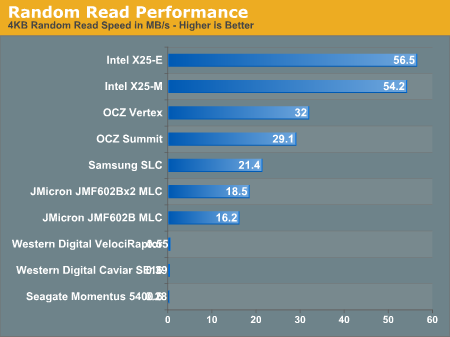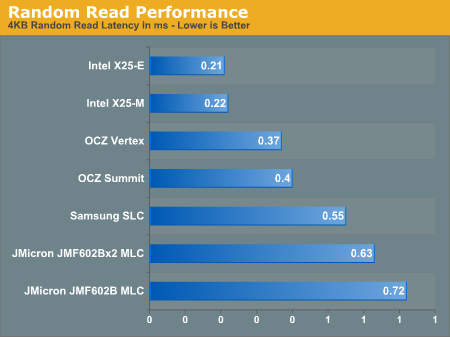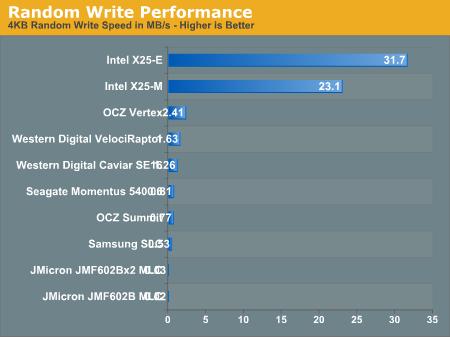The SSD Anthology: Understanding SSDs and New Drives from OCZ
by Anand Lal Shimpi on March 18, 2009 12:00 AM EST- Posted in
- Storage
Random Read/Write Performance
Arguably much more important to any PC user than sequential read/write performance is random access performance. It's not often that you're writing large files sequentially to your disk, but you do encounter tons of small file reads/writes as you use your PC.
To measure random read/write performance I created an iometer script that peppered the drive with random requests, with an IO queue depth of 3 (to add some multitasking spice to the test). The write test was performed over an 8GB range on the drive, while the read test was performed across the whole drive. I ran the test for 3 minutes.

The three hard drives all posted scores below 1MB/s and thus aren't visible on our graph above. This is where SSDs shine and no hard drive, regardless of how many you RAID together, can come close.
The two Intel drives top the charts and maintain a huge lead. The OCZ Vertex actually beats out the more expensive (and unreleased) Summit drive with a respectable 32MB/s transfer rate here. Note that the Vertex is also faster than last year's Samsung SLC drive that everyone was selling for $1000. Even the JMicron drives do just fine here.
If we look at latency instead of transfer rate it helps put things in perspective:

Read latencies for hard drives have always been measured in several ms, but every single SSD here manages to complete random reads in less than 1ms under load.
Random write speed is where we can thin the SSD flock:

Only the Intel drives and to an extent, the OCZ Vertex, post numbers visible on this scale. Let's go to a table to see everything in greater detail:
| 4KB Random Write Speed | |
| Intel X25-E | 31.7 MB/s |
| Intel X25-M | 23.1 MB/s |
| JMicron JMF602B MLC | 0.02 MB/s |
| JMicron JMF602Bx2 MLC | 0.03 MB/s |
| OCZ Summit | 0.77 MB/s |
| OCZ Vertex | 2.41 MB/s |
| Samsung SLC | 0.53 MB/s |
| Seagate Momentus 5400.6 | 0.81 MB/s |
| Western Digital Caviar SE16 | 1.26 MB/s |
| Western Digital VelociRaptor | 1.63 MB/s |
Every single drive other than the Intel X25-E, X25-M and OCZ's Vertex is slower than the 2.5" Seagate Momentus 5400.6 hard drive in this test. The Vertex, thanks to OCZ's tweaks, is now 48% faster than the VelociRaptor.
The Intel drives are of course architected for the type of performance needed on a desktop/notebook and thus they deliver very high random write performance.
Random write performance is merely one corner of the performance world. A drive needs good sequential read, sequential write, random read and random write performance. The fatal mistake is that most vendors ignore random write performance and simply try to post the best sequential read/write speeds; doing so simply produces a drive that's undesirable.
While the Vertex is slower than Intel's X25-M, it's also about half the price per GB. And note that the Vertex is still 48% faster than the VelociRaptor here, and multiple times faster in the other tests.










250 Comments
View All Comments
coil222 - Wednesday, March 18, 2009 - link
Yes I run a pair of MTRON 7500s in a raid 0 stripe for my OS and Gaming (wow). I don't recall numbers off the top of my head but tests were better on the raid 0 than a single drive configuration.Watch this:
http://www.youtube.com/watch?v=96dWOEa4Djs&fea...">http://www.youtube.com/watch?v=96dWOEa4Djs&fea...
sawyeriii - Wednesday, March 18, 2009 - link
I just wanted to state how much I loved the combination of technical and real world information in this article.What is the possibility of having different page sizes built into a drive? I.e. you could have a drive with many 1k page packages on one die, 2k on another, and most others 4k. Could that theoretically help? Could the controllers work with that (or would you need to combine multiple 1k's into a 4k transfer size)?
PS One note on page 3, the VelociRaptor and Intel in the first chart (responce time) are switched, however the text is correct.
StormyParis - Wednesday, March 18, 2009 - link
the ugly truth is that an SSD won't let you do anything that you couldn't do without it, and due to its cost and small capacity, it's not a replacement drive, it's an extra drive: not less power consumption but more, not less noise but just the same. You just gain a bit of time when booting up and lauching apps... which I do about 1/week and 1/day, respectively. Assuming your system has enough RAM (and if it doesn't, buy RAM before buying an SSD !), you won't feel much difference once the apps are launched.For the same cost, I'd rather buy a bigger screen.
It's urgent to wait for prices to come down. But I'm all for lots of people buying them now and help get the price down for us wiser buyers.
Rasterman - Thursday, March 19, 2009 - link
I've already decided my next system in a few months will have one, after you go through 5 hard drive failures (over several years) lets see how much your willing to pay to not have to put up with it anymore. If you use your PC for anything useful (work) then an SSD is a no brainer even at $1000/64GB IMO if the data security is there, speed is secondary for me.When you already have the best screen, video card, memory, why not have the best drive? And your argument is pretty dumb, almost any upgrade won't let you do anything that you couldn't do without it, not just SSDs.
Calin - Wednesday, March 18, 2009 - link
You get lower power due to the lower power use of the SSD and the fact that the other drive is not stressed with difficult access patterns (small random reads/writes). Remember that idle power of a SSD drive is very low7Enigma - Wednesday, March 18, 2009 - link
No, his comment was accurate for most users. Due to the small capacities and high cost these will be used as boot drives primarily with maybe a single heavily used program (say the current game or program you are playing/using), the rest will be on an additional drive. So while the power consumption of the SSD would be less than the old drive, the aggregate power usage of both (even when the larger storage drive is primarily at idle) will be higher than the single HD.And I believe you meant to say traditional HD for idle power?
strikeback03 - Wednesday, March 18, 2009 - link
If all you were going to throw on the drive is the OS and a game, a 32GB drive should be plenty. The reason the 80GB and up range is important is so general consumers can load all their programs on it.But yes, in consumer usage other than a laptop, some people who were previously using one drive for both boot and storage would likely need a mechanical HDD is addition to the SSD. OTOH, those who were using a Velociraptor (or RAID array) for boot and another drive for storage will see their power consumption decrease.
sawyeriii - Wednesday, March 18, 2009 - link
Have you used a SSD? (If so which)I would state that it is not a luxary product, it is a premium product. The price difference you pay WILL translate to faster performance (if you choose correctly). More RAM only helps upto a point.
Remember performance is based on a system of parts...
CPU
RAM
NORTHBRIDGE
GPU
SOUTHBRIDGE
I/O INTERFACE
HDD/SDD
Microsoft's Windows Experience Index has specific flaws, but the concept is sound... The system can only go a fast as the slowest component in the system (relative to the amount of time used by that component).
Testtest - Wednesday, March 18, 2009 - link
... there's also Supertalent's Ultradrive ME (MLC) and LE (SLC) and Photofast's G-Monster v3At least the Supertalent drives are quite a bit cheaper with the same drive layout/controller than the Vertex drives and only differ in the firmware (which isn't bad either).
It's however possible at least with the Ultradrive ME currently to provoke a kinda timeout error after they've been fully filled once and then still beeing written on. I don't own a Vertex so I can't test that there but if it was a controller issue, it should pop up there sooner or later as well (if you take a look in their suppport forum some error reports seem very similar).
Intels have their 80% bug, Indilinx drives have their issues too it seems - let's hope that firmware can cure it!
Great article btw!
iwod - Thursday, March 19, 2009 - link
Both SuperTalent and OCZ 30 / 32 GB drive cost exactly the same on NewEgg$129